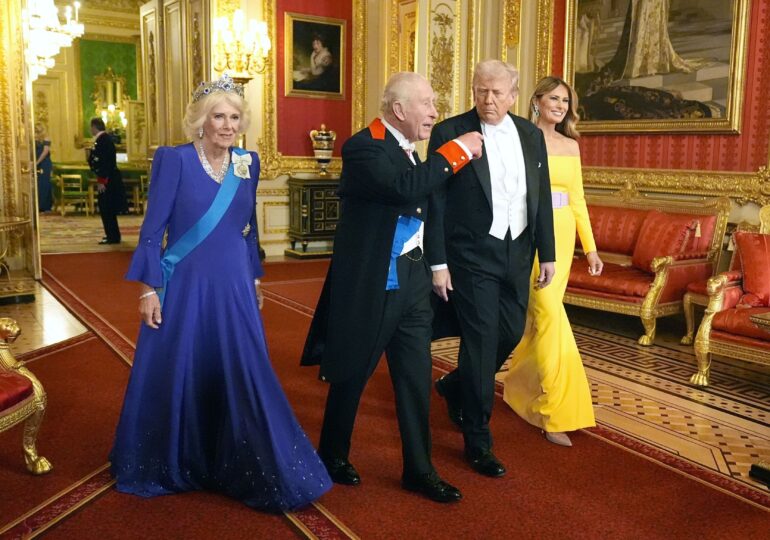In his state banquet speech, Donald Trump said that the bond between the United States and the United Kingdom is „unshakable.” In reality, the British government has been fearing all week that a misstep during the US President’s visit could blow up the „special relationship” – and, with it, Keir Starmer’s premiership mandate.
Trump’s second state visit came at a disastrous time for the British Prime Minister, already under pressure. Just days before Trump’s arrival, Starmer sacked Peter Mandelson from his position as the UK ambassador to Washington, after his links to sex offender Jeffrey Epstein became impossible to deny.
Starmer then had to ensure that Mandelson's absence wouldn't draw attention to Trump's connections with Epstein. (The President claims to have severed his friendship with the disgraced financier in the mid-2000s and hadn't spoken to him for years before his death in prison in 2019.)
Nothing was supposed to overshadow Trump's visit, notes CNN. Activists who projected images of Trump and Epstein onto Windsor Castle the night before the American President's arrival were arrested. The President was always kept away from the British public, to shield him from protests against his visit and policies. Even journalists seemed more lenient: at a press conference, Starmer was asked only one question about Epstein, to which he quickly and evasively responded.
If the government's objective was to avoid blunders, then that modest mission was accomplished. But now that the visit is over, the UK is taking stock: for two days, the British state overwhelmed Trump with all possible pomp. What did it gain in return?
"Tech Prosperity Deal" - £150 billion investments
Starmer's biggest success is the £150 billion investment package from American companies, titled the "Tech Prosperity Deal."
Around £31 billion will come from tech giants to bolster the UK's AI and IT infrastructure, while the bulk of the investment - £90 billion - will be made by the private equity firm Blackstone over the next decade.
Eager to bring good economic news ahead of the November budget presentation, the government claims that these investments will create approximately 7,600 jobs.
However, not everyone is convinced. Many of the investments were already announced commercial decisions, now packaged into an "agreement" to coincide with Trump's visit.
"There are big question marks over the details of these deals, including what concessions the UK made to keep these technological ties," said Olivia O'Sullivan, director of the "UK in the World" program at the Chatham House think tank, to CNN.
Nick Clegg, former British Deputy Prime Minister and until recently Meta's policy director, warned that the deal is just "crumbs from Silicon Valley." "We are a kind of technological vassal state. This US-UK tech deal is just a new version of the UK clinging to Uncle Sam's coat," he said Wednesday at a conference in Cambridge.
Energy for the future of AI
Building the AI infrastructure envisioned by Jensen Huang, CEO of Nvidia and a guest at the state banquet, will require an increase in British energy production. Trump has long criticized London's plans to halt new oil and gas drilling, which could power data centers.
However, the two countries have found common ground in the nuclear field. The US and the UK signed an agreement this week to facilitate the construction of nuclear power plants in both countries.
But the economic benefits of these agreements are far off. "The proof will be in the pudding. People want to see clear economic effects, and those won't come soon," said O'Sullivan.
Tariffs, trade, and industry
In the short term, the UK's economy remains in the same state as when Trump arrived. The 10% tariff imposed by the US on most British goods is lower than that applied by the EU, and London boasts of being the first country to conclude a post-tariff trade deal with the US. Nevertheless, even 10% remains a high tariff, well above the level at the beginning of Trump's term, and the trade deal still lacks substance.
Prior to the visit, the UK hoped the US would lift the 25% tariff on steel exports. The plans were postponed, pushing the steel industry closer to collapse. Last month, the third-largest steelworks came under government control.
Foreign policy and relationship with Trump
On the foreign front, Starmer managed to avoid major conflicts. Although Trump said he disagreed with London's plan to recognize the Palestinian state this month, he didn't vehemently criticize the Prime Minister.
However, Starmer didn't secure any new commitments. Trump said that Russian President Vladimir Putin "has deeply disappointed me" for not ending the war in Ukraine, but he didn't commit to increasing pressure, stating that he would only do so when NATO countries stop buying oil and gas from Russia.
Domestic politics: Farage's rise
One thing the UK surely gets from Trump is an increasingly "Trumpist" policy. Nigel Farage, leader of the Reform UK party, is far ahead of Labour in polls, promising to "make Britain great again" and reduce the British state following the DOGE model.
Farage has consistently attacked the government for failing to control illegal immigration – a delicate subject for Starmer, even at the end of the press conference. Asked about his efforts to stop illegal immigration at the US southern border, Trump told Starmer that he should "call in the military" to solve the issue in the UK as well. Trump's advice could embolden the far-right opposition.
In conclusion, if Starmer's objective was to avoid any missteps, the visit was a success. But if the goal was to turn Trump's Anglophilia into concrete commitments on trade and foreign policy, the UK might feel it received too little in return.
G.P.

